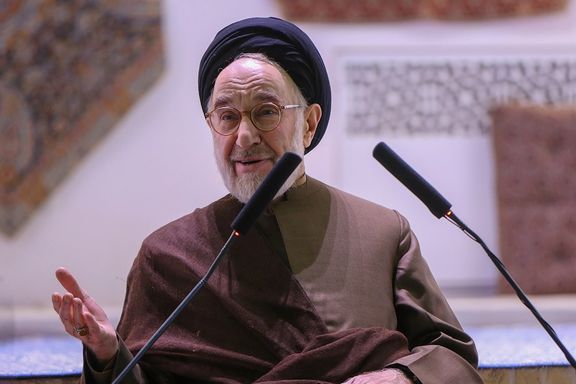Reformist ex-president says most Iranians focus on life, not politics

Iran’s former president Mohammad Khatami said most people in the country are more concerned with living their lives amid worsening economic conditions than with who governs them.

Iran’s former president Mohammad Khatami said most people in the country are more concerned with living their lives amid worsening economic conditions than with who governs them.
“Eighty percent of the Iranian people are not political in a certain sense, and it does not matter much to them who governs or how; they only want to live and to have security and a clearer outlook for the future,” Khatami said.
He said the country has never experienced a situation as severe as the one it faces now, with challenges and threats unlike anything seen since the 1979 Islamic revolution.
Khatami compared Iran’s governing system to “a sturdy tree” that had long endured hardship but now faced mounting dangers.
“This sturdy tree may be able to withstand drought and storms for many years, but today the internal and external threats and problems are so vast and significant that there is a fear this sturdy tree may suddenly wither and collapse, may that day never come,” he said.
Economic hardship
The former reformist president's remarks come as the government struggles to contain soaring prices and widening poverty.
According to Iran's Parliament’s Research Center, over a third of Iranians live in poverty.
Rising inflation and a weakening currency have helped drive up costs of living in Iran and economic pain has deepened as Western and European-triggered international sanctions compound the country's international isolation.
Earlier this month, a senior economist at Iran's Ahvaz University, Morteza Afghah, warned that annual inflation could exceed 60% by the end of the Iranian calendar year (March 2026).
Surveys say otherwise
Last week, a survey by Tehran-based news site Rouydad24 found that 92% of Iranians are unhappy with the country’s direction.
“What is clear is that total public satisfaction with all governments since the revolution is now overshadowed by a 92 percent dissatisfaction with the country’s current situation,” Rouydad24 said.
According to the outlet, the level of satisfaction with Khatami's successor Mahmoud Ahmadinejad’s administration was highest overall, while those of Hassan Rouhani and Masoud Pezeshkian ranked lowest.
Another survey conducted by a Netherlands-based polling institute last year found that the majority of Iranians would vote for either a regime change or a structural transition away from the Islamic Republic.
The Group for Analyzing and Measuring Attitudes in Iran (GAMAAN), which conducted the survey in June 2024, said it polled more than 77,000 respondents inside Iran, weighting the results to represent the literate adult population.
“A majority of the population opposes the Islamic Republic and supports changing or transforming the political system,” the report’s author Ammar Maleki said.
Only around 20 percent of respondents want the Islamic Republic to remain in power, according to the survey.
The survey found no single consensus on what system should replace the current order. A secular republic was backed by 26 percent of respondents, while 21 percent supported a monarchy.
Another 22 percent said they lacked enough information to decide, and 11 percent said that the form of an alternative system was not important so long as change occurred.